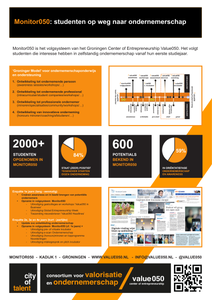Monitor050 is het volgsysteem van het Groningen Center of Entrepreneurship Value050. Het volgt studenten die interesse hebben in zelfstandig ondernemerschap vanaf hun eerste studiejaar.
DOCUMENT

Het stappenplan kan worden gebruikt om zicht te krijgen op de omvang en kwaliteit van de ontwikkeling en verankering van ondernemerschapsgericht onderwijs in een opleiding.Daarnaast biedt het instrumentarium om het onderwijs gericht op ondernemen waar nodig of wenselijk te versterken en input om het HG/VNO-NCW MKB Noord - kortweg HG/VNO-label Ondernemen - voor opleidingen en minoren aan te vragen. Dit label levert een externe validering op die bij de werving van studenten en externe communicatie gebruikt kan worden.
DOCUMENT
